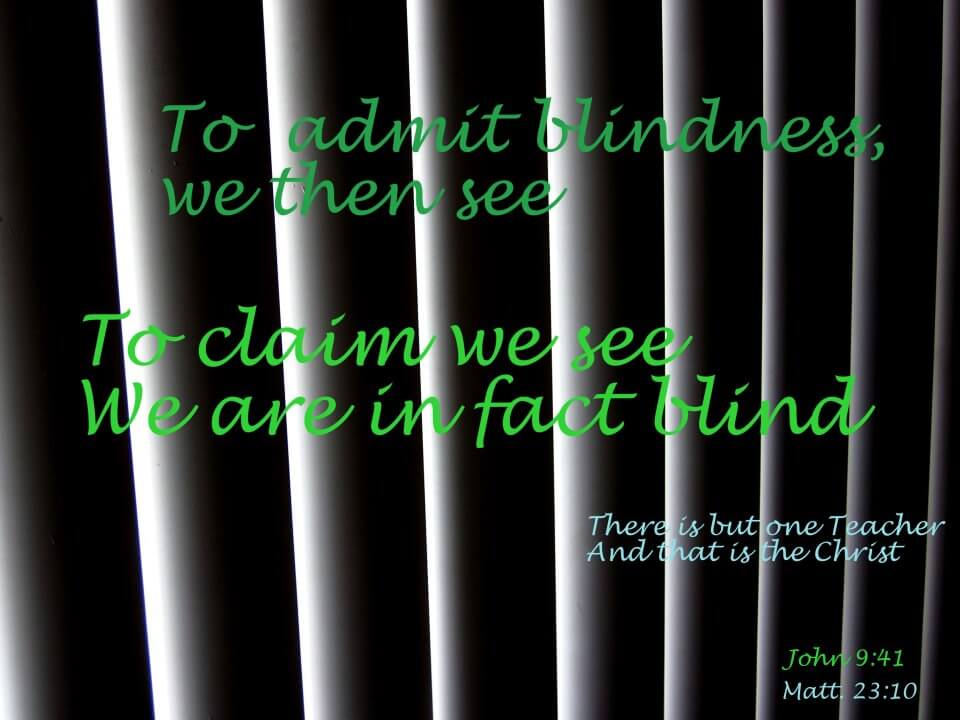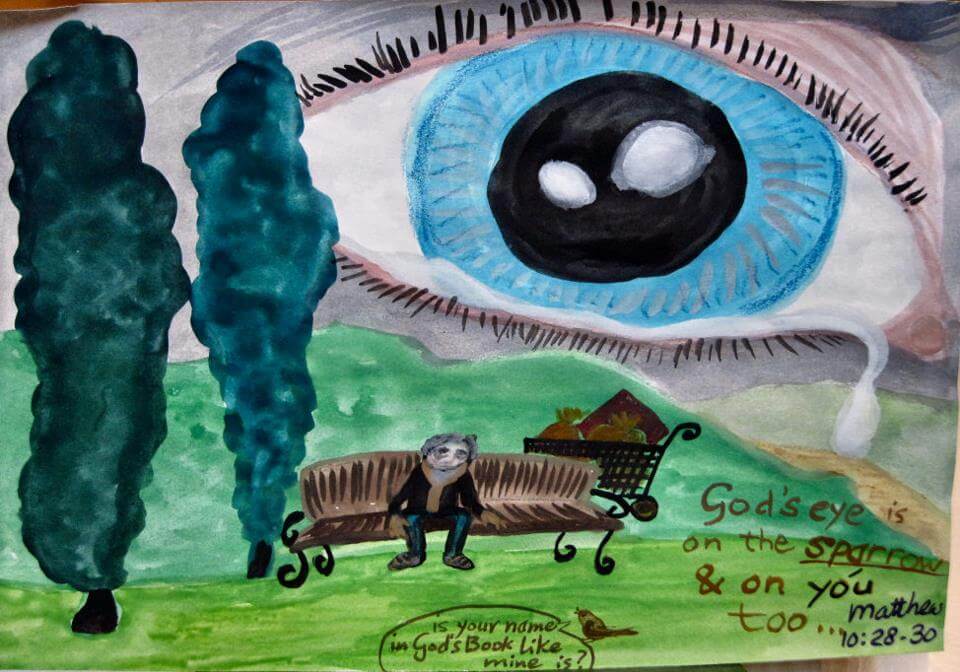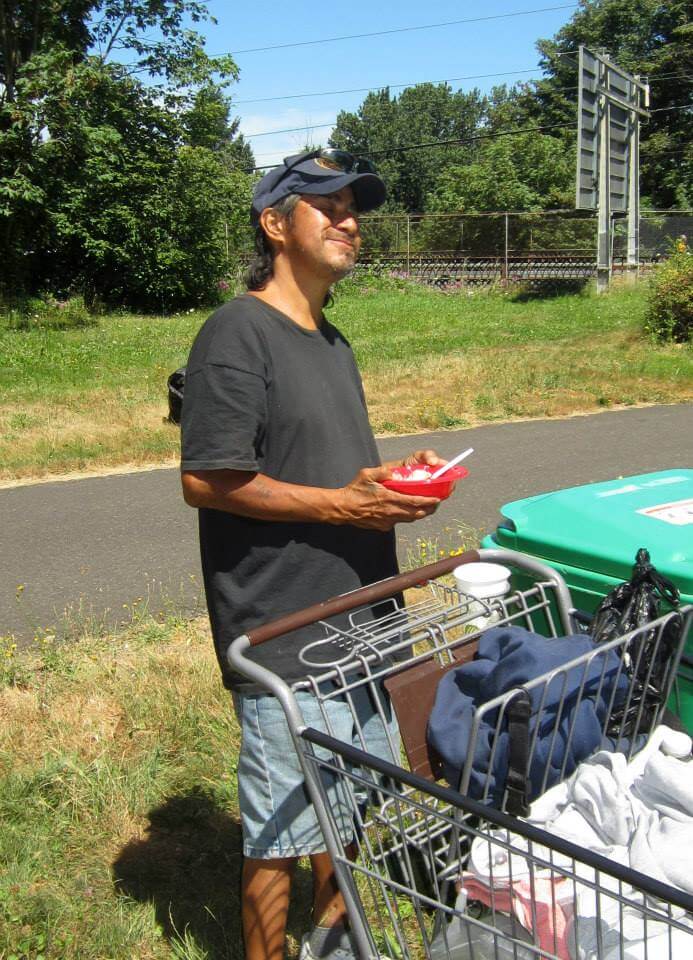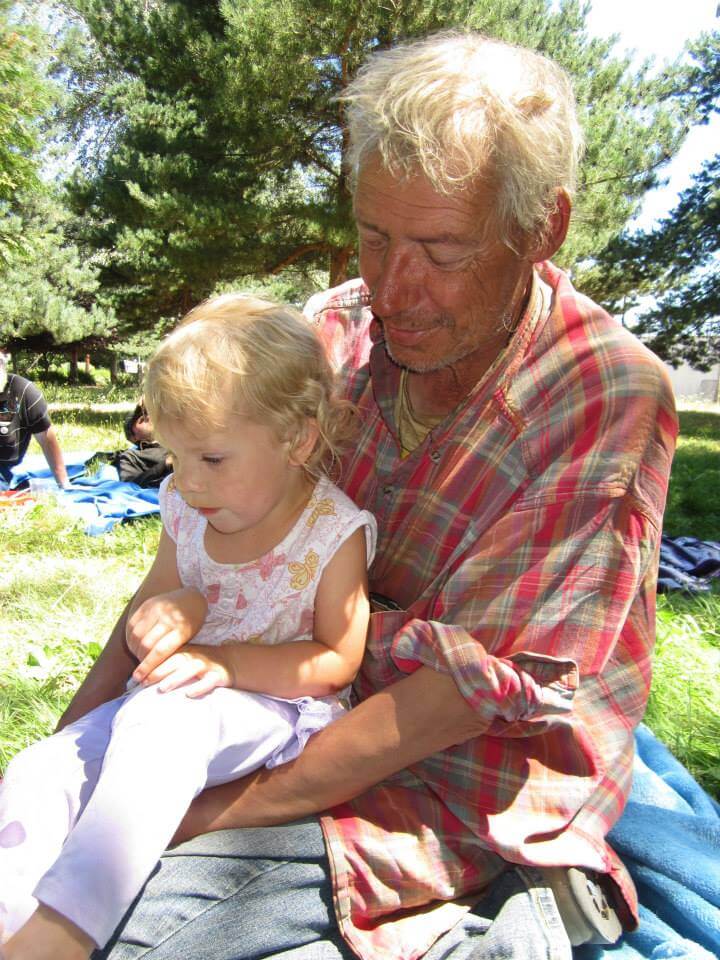-
Following Jesus: Final List
 I’ve always got blinders on.
I’ve always got blinders on.
In following Jesus love is central so I can’t hate or be apathetic.
(by which I mean I can but I can’t if I’m following Jesus).
In following Jesus I always begin with the low and I can’t get wealthy support first.
Leadership is servanthood, so patriarchy is out.
Forgiveness and restoration is always the goal, so I can’t cut anyone off.
Mercy is the law, so meeting needs is a constant activity.
I live at creating peace, so violence and harshness is out.
Poverty is a blessing so personal wealth isn’t an option.
Wisdom is found in the uneducated, so no diplomas for me.
Vulnerability is basic, so I can’t protect myself as much as I’d like.
There’s a lot I can’t do.
But this is the path the world is changed.
One act of kindness at a time.
Following Jesus is a limitation.
But one I’m glad of, for my life wouldn’t be worth much otherwise. -
Membership is Not Free
 The Third World is alive and well within North America. The poor are in the apartments with black mold; they are in the food stamp offices and being run out from under bridges. Difficulty and disease and shame mark their lives; they’re stigmatized like lepers. Jesus is among these people; living with them, encouraging them and doing miracles among them.
The Third World is alive and well within North America. The poor are in the apartments with black mold; they are in the food stamp offices and being run out from under bridges. Difficulty and disease and shame mark their lives; they’re stigmatized like lepers. Jesus is among these people; living with them, encouraging them and doing miracles among them.But you’d never know this by looking at the churches of North America.
A few churches cater to the upper class, but the massive majority of churches throughout North America see themselves as ministering to “communities”, by which they mean communities of the middle class. The poor are left out of the equation of the normal, everyday life of the church. And because of this, the church itself is poorer. Below are four areas in which the poor are marginalized in most modern churches:
1. Cultural uniqueness
The third world of North America is unique, and has unique features. For one thing, its inhabitants tend to use foul language, even the most religious of them. More poor people smoke than middle class people, and they are also more likely to have obvious addiction issues. Poor people tend to be less educated and focus more on survival. But, paradoxically, the poor are more likely to give their last dollar to someone else in need. Poor folks are more likely to rely on God instead of a system or even their own work. These are unique cultural characteristics, not right or wrong, just different. There are weaknesses and strengths in this culture, just as there are in the cultures of the middle or upper classes (or, indeed, in any culture).
The cultural uniqueness of being poor isn’t celebrated, but preached against in the everyday church. Not that every facet of poor culture should be celebrated; but the same is true of the middle and upper class cultures. When we praise the middle and upper class trait of making and following a reasonable budget, for example, why can we not also praise the lower class trait of sacrificial generosity? The church cannot be a culture-free environment, but in our middle-class model of church, where can the poor worship in a manner cohesive to their culture?
2. Stamped with otherness
This does not mean that the poor do not go to church. They don’t go as frequently, but since many know that participation with God is participation in the church (which is, all too frequently, not really Jesus’ body, but only a form of Christendom), they will go. But when they do, they are considered outliers. A church made up of the poor is traditionally called a “mission” because the poor aren’t naturally considered a part of a church. Instead, they are often considered “converts” when they regularly attend a church, because after all, if they were actually spiritual they’d be financially self-sufficient, right? The poor aren’t fully “sanctified” until they give up the ways of the poverty class—smoking, drinking, “low” language—even though these requirements aren’t made by Jesus. Even those things (like the aforementioned generosity) which should be considered “good” are simply considered foolish or wasteful if one is not on solid financial ground. Until the poor can afford to dress and use educated language like the rest of the church, they aren’t considered part of the norm. Because of these church norms being shaped by middle class norms, the poor have developed a notion of individual spirituality, without a corporate component. Because they don’t “fit” in the average church.
Even a church that is very oriented toward the poor participates in this hierarchy. They are told they need to “go out and serve the poor”, because the poor aren’t a part of them, but a group that is outside of them. And rather than welcoming them and their insights, often reserved for the middle class potential member, they are told to “serve” them out of pity or even guilt. But this service is that of the haves to the have-nots, the higher to the lower. The poor are not asked to participate in spiritual service, let alone lead it, in an average church context.
3. Limited participation
The social activity of even the most open churches are based around many activities that the poor cannot attend; due to their poverty. Of course, public worship, small groups, bible studies and potlucks are free to all who wish to come. But those contexts are only the formal meetings of a community (although some small groups are an exception). The real social connection with other members of a community, the support network, happens at informal gatherings. These informal gatherings often happen in restaurants after worship, and at retreats and camps. The youth have this same structure where some activities are free, but the activities where deeper connections happen cost money. When the middle class take retreats and after-worship paid meals for granted, the poor feel separated and shamed because of their lack of participation.
4. The Leadership Gap
Leadership in a church is reserved for the middle or even upper middle class. Part of this has to do with practical considerations: the upper middle class has more leisure time and so they are able to participate in meetings, while the poor must spend time working to survive. National or regional conferences are often expensive and require travel. This creates a class-based leadership perspective, which cannot imagine the spiritual or physical needs of the poor, because few of them have ever been in that circumstance.
In bringing up this issue to the moderator of MCUSA, I was told by him, “For those I’ve talked to, the poor don’t even want leadership, so why is this an issue?” Of course the poor don’t want leadership. The culture of church leadership is so foreign to them, that the idea of speaking out in a meeting with their very different perspective and language and communication styles scares them. But that misses the point. The point is, our churches need the poor, we need them to be equal partners and we need them in leadership.
We need them because the poor are an essential part of our church life—not as service projects, but as fully human people we need to interact with, to love and to learn from and to minister to and to receive ministry from.
We need poor people in leadership because we want to meet the actual needs of the poor—not the needs we have imagined for them when we try to put ourselves in their place. We need the poor to be equal because Jesus is among the poor, living with the poor and, frankly, alive among the poor, more than in many of our churches.
If we are going to have Jesus in our church, we must have the poor, even though that disturbs our middle class “order”. Accepting the poor as equals feels, to the middle class, chaotic. And it often is chaotic, like any exchange of ideas. But marginalizing the poor, as Christendom has done for centuries, is marginalizing Jesus.
“Did not God make the poor rich in faith and heirs of the kingdom which he promised to those who love Him? But you have dishonored the poor…” James 2:5-6
-
Following Jesus: List #5
 I’m not interested in being a Christian
I’m not interested in being a Christian
whether a zealot, or a mystic, or denominational promoter or spirit-filled.
I’m not interested in being the family guy
whether the proverbs 31 gal, the good spouse or parent.
I’m not interested in being the social justice guy
whether of the racism, sexism or classism variety, or even a homeless advocate.
I’m not interested in being the smartest guy in the room
a rationalist, a poet, a history expert, a Bible scholar or move nerd or Menonerd.
I’m not interested in being a leader
whether preacher or administrator or prophet.
I’m not interested in being a repentant sinner
whether an ex-addict or former fundie or on a diet.
I’m not interested in offering services
whether being a tax consultant, an EMT or handing out blankets.
(Honestly, I’d like to be all of these things
And sometimes I am all or some of these things.
But all these things are crap compared to following Jesus.
In the end, it’s always following Jesus I come back to
and surrender everything I can do or be to him.) -
Public Poverty
 Public poverty is being ignored by all except those who notice the troubled—cops and bleeding hearts. All else turn away or turn aside or patch their pity with a coin. Public poverty is crying out for help and being told to shut up. It is a desperate plea to be normal, and the eventual surrender of this hope when normalcy is a dream of the past. Public poverty is too much honesty, revealing one’s difficulty and shame and others assume that you are lying; it is the heaping of scorn when you are desperate for a little kindness.
Public poverty is being ignored by all except those who notice the troubled—cops and bleeding hearts. All else turn away or turn aside or patch their pity with a coin. Public poverty is crying out for help and being told to shut up. It is a desperate plea to be normal, and the eventual surrender of this hope when normalcy is a dream of the past. Public poverty is too much honesty, revealing one’s difficulty and shame and others assume that you are lying; it is the heaping of scorn when you are desperate for a little kindness.Really, poverty is like sex, only not as fun. Some revel in it and don’t care where it is displayed, but a majority of people are fine with it in private, but disgusted with it in public. Like sex, poverty should never be mentioned in polite company, and the more details someone describes poverty in, the more offensive they become. “Poverty should only be discussed in counselling sessions, with social workers or pastors, but please don’t publicly discuss how you can’t pay your bills, and please don’t display your poverty in a way that all of us can see it.”
The homeless are the professionally poor, those who have no choice but to represent the public poor. The homeless are scorned and even hated because they represent all that is wrong with our communities. They are the indications that our nation is not an economic success, no matter how much of a powerhouse we are on the international economic stage. The homeless are the crazy uncle you want to keep in the closet, especially when there are guests, but that is especially when he appears, naked and saying something insane. Just by their existence, the homeless make us uncomfortable.
The real problem with homelessness is that it doesn’t know where to keep its place. It appears right where you don’t want it to appear—around city hall, on freeway on-ramps, in public parks. The public poor appear in the places where a city wants to showcase their friendliness or family nature. Instead, they are revealed to be a hotbed of poverty and drunkenness.
But the public poor are simply doing what everyone else is doing, except on the street: They are drinking a beer, they are laughing too loud with friends, they are asking for help. They are desperately trying to forget about their miserable, mundane existence for only a moment. They are trying to forget that the silence they experience daily, the turn of the head is scorn being poured upon them. They are trying to erase the judgments that sentenced them to this miserable life, even the judgments that they put upon themselves.
 Policy makers, in seeing the public poor as a serious social problem, do one of two equal errors. First, they might force the public poor to be silent, to be out of sight. For this, they create laws which make it illegal to be the public poor, or for them to be seen by the populace. They might create a skid row, or at least move them out of the downtown area, out of sight, out of mind. They might shuffle them into jails, as a housekeeper might sweep dust under a carpet.
Policy makers, in seeing the public poor as a serious social problem, do one of two equal errors. First, they might force the public poor to be silent, to be out of sight. For this, they create laws which make it illegal to be the public poor, or for them to be seen by the populace. They might create a skid row, or at least move them out of the downtown area, out of sight, out of mind. They might shuffle them into jails, as a housekeeper might sweep dust under a carpet.But this is not a solution. For the more scorn and punishment policy makers apply to the poor, the more public poor there are. This is because public scorn, public punishment is acceptable punishment, that which can be replicated and increased by the public citizenry. That which is done in the public parks will eventually be repeated in homes and churches and elsewhere. And the poor of a home is no longer cared for at home, but is moved to be homeless. The poor of a church is no longer cared for at a church, but is seen as unacceptable anywhere. If there is no place for the poor, the only place for them is the public areas. And if the public areas are not acceptable, then the only place for the poor is no place. Non-existence.
The other solution for policy makers is to end poverty or end homelessness. This means taking millions of public dollars and putting them into institutions for the poor. In the past, it used to be missions to religionize the poor, as if their problem were a lack of religion. Then they shelter the poor, stacking them like firewood, and herding them into cafeterias. Now they want to eliminate the public poor by giving apartments or single-resident occupancies, so they can be poor in private.
The problem is that these solutions are too expensive for all the public poor, and the system of scorn will not allow them to be “rewarded” with a room without a kitchen with public money. A different government, a different mayor and compassion dries up like a puddle in a drought.
The only real solution is equality. Give the public poor a chance to determine what the solutions should be for themselves. Yes, they will make mistakes, but we should give them that. The only solution is to give the public poor the respect of a human being. To look at them, to love them enough to smile and say “no”. The only solution is to give them what they lack: a social network so they can solve their own problems. Help them to see what opportunities exist and let them make their own choices.
Surprisingly, some may choose a life outside, without walls, without bills, without demands (or perhaps not so surprisingly). They should be given a place to live in poverty, or to work their way out of poverty. Some may choose education, some may choose a steady job (if one is offered) and some may choose reuniting with their family. But if they are given respect and an opportunity to choose, choose they will.
What the public poor lack is opportunity of choice, and the respect to be offered a choice. They are treated as dogs, as piles of garbage that should be cleaned up, as proto-criminals that will soon need to be arrested. Instead, they should be treated as they are—citizens. Treated as human beings who deserve to be heard just as much as we do.
-
A Trip to the Store
 I have my poles and rods and just returned from Fred Meyer with hooks, weights and power bait. Look out trout.
I have my poles and rods and just returned from Fred Meyer with hooks, weights and power bait. Look out trout.An’ while I was at Freddies, searching out the best prices on hooks and such, there was this dad who had 3 kids– two boys and a girl– and their needle was stuck and could only utter one word: “Dad.” Over and over and over. Until I went around to find “dad” nose buried in a flat screen, texting.
I went up to him and tapped him on the shoulder and saw it wasn’t a text it was a game. He looked at me blankly and said “What?”
“Pay attention to your kids they have been trying to ask you something for the last 10 minutes.”
He threw up his hand and said, “They have nothing to say that is important that I want to hear.”
“And you call yourself a Dad?” I exploded. I turn to the kids and said, “You have my deepest sympathies.”
The guy says, “Hey, what do ya expect… Their mother divorced me and then dumps them on me once a month. I don’t even like kids…….why don’t you take them?” and turned to walk off.
“If I take them you go to jail. The police will contact Mom to come and get them. Child abandonment is a serious felony crime.”
Apparently Fred Meyer’s security was alerted because no sooner had the words left my mouth they were there with Gresham Police in tow. No one went to jail and dad kept the kids with a stiff warning from the officer, and I silently back away muttering a prayer for the kids and their dad.
* * *
So I pay for the toys and I am in my truck munching on a York Peppermint Patty singing with my mouth full with the radio “Sergeant Peppers Lonely Hearts Club Band’s song “All Ya Need is Love”. An older couple come to the vehicle in front of me and a struggle ensues because he cannot get the key to turn in the lock. Then, with a mighty twist, he breaks the key off in the lock. This results in a full-blown 70-year-old’s temper tantrum.
But then comes the real problem. Another elderly type gent comes and asks what the first man is doing to HIS car.
Yup the reason for the keys failure was it was the wrong car and on that note I had to leave, for I thought it was very poor form to break out in gales of laughter.
3733 N Williams Ave
Portland, OR 97227
503.888.4453
AnawimCC@gmail.com
Ministry Locations and Times »











